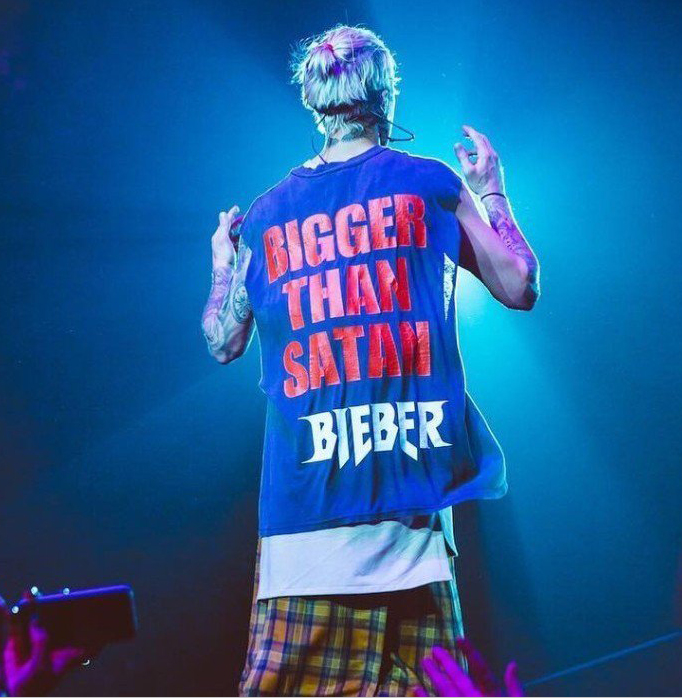The “Christ-Washing” of Justin Bieber: Religion as a Marketing Tool for Pop Stars

“Bigger than Satan.” That’s the phrase, along with a photo of rock musician Marilyn Manson, emblazoned across a t-shirt worn by pop music’s good-boy-turned-bad-boy—and back—Justin Bieber at a concert in Vancouver on March 11. The unusual choice in apparel made entertainment headlines because it seemed too edgy to appeal to Christian “Beliebers,” especially given its reference to Marilyn Manson, to whom the quote is originally attributed.
When Manson proclaimed himself “Bigger than Satan,” he was likely inverting a statement attributed to famous Beatles singer, John Lennon. In a 1966 London Evening Standard interview, John Lennon said about the Beatles, “We’re more popular than Jesus now.” At the time, the quote was taken out of context and published by a US teen magazine, which led to some controversy for the band. Manson, however, was likely inviting controversy with his statement, as his fame has been based on his ability to shock audiences with antics that range from merely off-putting to outright ridiculous and offensive.
In referencing Manson, however, Bieber appears to be attempting to be both controversial and conventional, a fine line that he, and many other pop stars marketed to preteens, must walk. The Jonas Brothers, a boy band active from 2005-2013, were a similar tween sensation that needed to carefully manage their image as edgy enough to be appealing to youth angst while also not being so rebellious as to make themselves unmarketable in the mainstream. Singer (and former girlfriend of Bieber) Selena Gomez, finds herself in a similar position, in which she, like nearly all women in the pop music industry, must appear conventionally attractive and sexually appealing while also upholding a “good girl” image.
One way to resolve these contradictions around crafting pop stars’ “images” is to play up their Christian beliefs. Bieber’s latest album, Purpose, is centered on its Christian-themed title track. The Jonas Brothers were famous for wearing purity rings, and Selena Gomez has discussed her Christian faith in interviews. A coworker of mine referred to this tendency in the media as “Christ-washing.” In the case of Justin Bieber, his outrageous t-shirt becomes not just a shocking statement and ironic pop music reference but also an expression of his Christian faith.
 The t-shirt was designed by Jerry Lorenzo, a fashion artist whose Fear of God label attempts to present Christianity. In a 2014 interview with Hyperbeast, Lorenzo explains the religious aspects of his designs, which are meant to be understated but still accessible to those who are “in the know” about his faith. “I try to do it in a subtle way,” Lorenzo told Hyperbeast. “Sometimes through scriptures that we put up on our Instagram, like instead of Matthew 16:24, it would be the fortieth book 40 16-24 – so you’re not really sure, unless you know the Bible…” Lorenzo also described how he wanted to use Fear of God to establish the Christian kids as the truly cool kids through their faith: “The Christian kids were always not as cool as the real cool kids at school. So now [I want to show] that, ‘No, we are the cool kids. We look cool and there’s some depth about us that is cooler than whatever is fleeting at this moment.’” In the interview, Lorenzo gives the impression that he feels his faith in God is timeless and transcendent, a quality he attempts to imbue into his clothing designs. He wants the credibility of putting out fashionable, contemporary clothes while at the same time claiming a more conventional, Christian meaning behind the designs.
The t-shirt was designed by Jerry Lorenzo, a fashion artist whose Fear of God label attempts to present Christianity. In a 2014 interview with Hyperbeast, Lorenzo explains the religious aspects of his designs, which are meant to be understated but still accessible to those who are “in the know” about his faith. “I try to do it in a subtle way,” Lorenzo told Hyperbeast. “Sometimes through scriptures that we put up on our Instagram, like instead of Matthew 16:24, it would be the fortieth book 40 16-24 – so you’re not really sure, unless you know the Bible…” Lorenzo also described how he wanted to use Fear of God to establish the Christian kids as the truly cool kids through their faith: “The Christian kids were always not as cool as the real cool kids at school. So now [I want to show] that, ‘No, we are the cool kids. We look cool and there’s some depth about us that is cooler than whatever is fleeting at this moment.’” In the interview, Lorenzo gives the impression that he feels his faith in God is timeless and transcendent, a quality he attempts to imbue into his clothing designs. He wants the credibility of putting out fashionable, contemporary clothes while at the same time claiming a more conventional, Christian meaning behind the designs.
In wearing Lorenzo’s “Bigger than Satan” t-shirt, Bieber is engaged in maintaining this same balance between being contemporary and conventional. The shirt is shocking, as evidenced by the media coverage it inspired, but when its message is “Christ-washed,” it’s also very traditional. The phrase “Bigger than Satan” may make Bieber sound like a badass, but it can also just as easily be a reference to 1 John 4: “the one who is in you [God] is greater than the one who is in the world [Satan].” Pop music by its very nature demands spectacle, and Bieber’s t-shirt allows him to be both an outrageous bad boy and a good Christian boy.
While there’s certainly nothing wrong with pop stars having personal religious convictions and worldviews, using Christianity as a marketing tool to create as broad an appeal as possible for singers like Bieber seems to be a disingenuous use of faith. Bieber’s t-shirt earned him positive media attention in religious outlets such as the Christian Post, Relevant magazine, and Christian Today, among others. This allows the music industry to tap into the Christian market to build Bieber’s appeal and also lets him off the hook for questionable songs such as “What Do You Mean?,” which sounds as though it encourages young men to ambiguously interpret women’s attempts to ward off their sexual advances. Even if Bieber isn’t always a perfect role model, his Christian faith makes him seem like a better person in the press. “I mean, I still am doing things that are stupid, but…It [Christianity] just gives me some sort of hope and something to grasp onto,” he said in an interview with GQ.
Given the way that this “Christ-washing” is employed to make young pop stars appear both rebellious and bad while simultaneously being conventional and good, one might think that Christians would object to their religion being used as a marketing tool to make profits for the music industry. Humanists should certainly object to the implications that this practice has about morality. Pop stars, just like everyone else, are not good merely because they are religious. A judgment as to whether someone is “good” should be based on their individual character and actions, not merely on whatever religious belief they profess.
